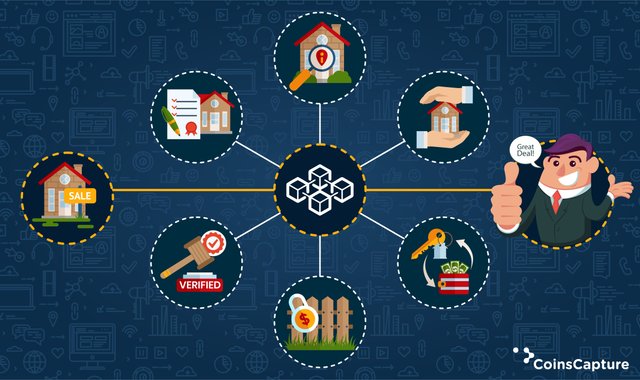6 Benefits of Blockchain in Real Estate Industry
https://coinscapture.com/blog/6-benefits-of-blockchain-in-real-estate-industry
Blockchain technology has shown tremendous innovation in various commercial industries. Likewise, blockchain can be beneficial in the real estate industry thereby maintaining it as an imperishable asset for its ever-increasing value.
Why there is a need to change the traditional market?
In the traditional market, there are constraints like relying on the middlemen (agents, brokers, attorneys, mortgage lenders, appraisers) forming a time-consuming and expensive process with mistakes made by humans in land registry records, lack of transparency, high fees and high risk of scams. Additionally, a huge amount of money gets wasted from both sides (investors or buyers) with less profitable earnings. Apart from these, a real estate agent also has to do a lot of paperwork and this legal paper has to be maintained for weeks, months or years until the process gets completed. Hence, such traditional processes are lengthy and draining human beings mentally, physically and economically or in all ways.
The above-said scenario completely changes when blockchain enters in, it transforms the entire process by offering a feature called smart contracts that increases transparency, trust, quick transfer of funds and liquidity in the market.
For e.g. Consider the process of property selling, the property papers are uploaded on the blockchain for which the rules are set using the smart contracts. As Smart contracts, do not require a trusted third party and the details are encrypted when added to the Blockchain which makes it clear, accurate and immutable history of property over time which can be accessed instantly. There are many other advantages from the blockchain
- Fraud reduction: Each year millions of money is spent on fake ownership due to forgery paper created by using editing software. In the blockchain, this is impossible because each and every information is recorded in the public database permanently which does not allow any modifications or changes. Every information added is recorded and arranged chronologically making it easy to view and helps to audit any security breach quickly.
- Accurate information: In Blockchain, the information recorded is 100% accurate because the data is verified using a unique identifier which principally works on cryptography. This eliminates completely all the trust issues and offers a crystal clear transparency between the two parties.
- No middlemen required: Traditional market involves a list of middlemen leaching out a huge amount of money and time. Smart contracts remove the maximum number of intermediaries since the process is almost automated and executed according to the pre-defined conditions. Hence, it requires no human participation.
- Faster legal issues resolution: In traditional market buying, selling or renting a property requires all the legal activities related to the property documents to be inspected by a lawyer. This inspection is done on paper which can be forged by the concerned parties. Also, this inspection is a manual process requiring few participants in between for verification which indirectly increases the cost of the process. Whereas, on blockchain records, these documents are digitized on special platforms due to which all the legal issues are resolved quickly.
- Fixed price: In smart contracts, the prices are mutually defined between the interacting parties for avoiding the unfair practice to occur due to money that usually occurs in the traditional market.
- Higher liquidity: In the traditional market, all the investments are considered to be illiquid because they can lose their value and become depreciated. But in blockchain, there is higher liquidity due to transparent records, smart contracts, and absence of paperwork which makes the process reliable and comfortable.
Hence, blockchain can be a magic wand modifying all the traditional process and offering exciting prospects for stream-lining an innovative protocol for a bright future in this industry.
